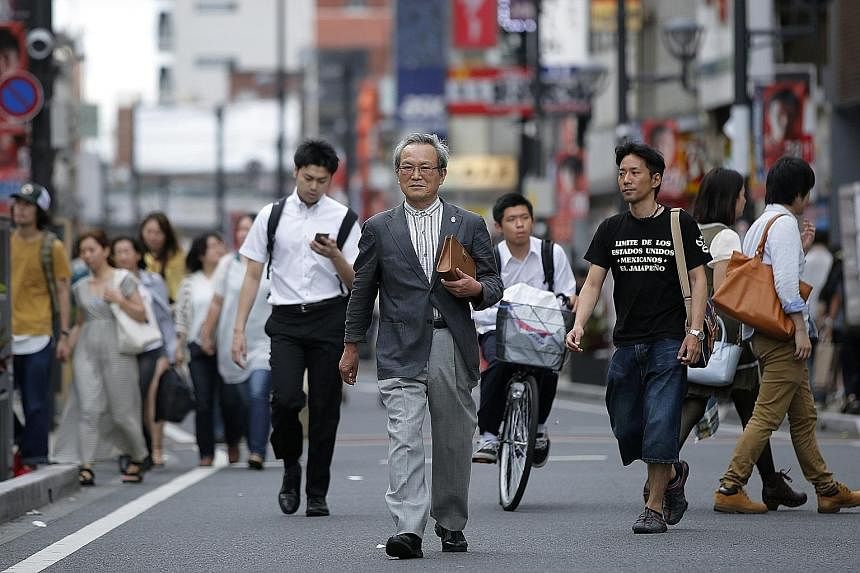TOKYO - Sipping beer and listening to a guitarist at an event for retirees in Tokyo, Mr Sadao Sekine said he backs government plans to cut Japan's ballooning debt - as long as he can keep his benefits.
"It's hard. I've had two serious illnesses," says the 75-year-old former trading company employee, pointing to his heart and his abdomen. "The Japanese medical insurance system is very advanced, and I'm grateful for that."
Mr Sekine and the dozen or so grey-haired groovers at the senior salon event are part of Japan's growing band of pensioners - more than a quarter of the population are 65 or over. With a shrinking birth rate, the proportion is projected to top 30 per cent within a decade, causing a surge in welfare spending in the world's most-indebted nation.
These retirees are also one of the most reliable constituencies of the ruling Liberal Democratic Party (LDP), contributing to Prime Minister Shinzo Abe's landslide re-election last December.
That is why LDP lawmaker Taro Kono describes his quest to cut benefits to the elderly as "almost suicidal".
As chairman of a party panel charged with seeking ways to balance the budget by 2020, Mr Kono has pushed a raft of cost-cutting measures, including increasing the proportion of medical and nursing care costs paid by elderly patients. The panel has also advocated means testing for healthcare and pensions.
An advisory panel to the Ministry of Finance says reforms are needed because of expected increases in costs. Social security spending is set to rise 36 per cent by 2025, with the bulk of that due to healthcare and nursing expenses rising 54 per cent and 134 per cent respectively, according to the ministry.
The government pledged on June 22 to limit spending growth to 1.6 trillion yen (S$17.6 billion) over the next three years, excluding debt payments and grants to local governments, as it seeks to reach a budget surplus in fiscal 2020.
Securing investor confidence in the nation's finances is crucial to keeping bond yields in check. Even so, the government has yet to put forward a realistic road map to achieving a surplus by fiscal 2020, according to Mr Hidenori Suezawa, an analyst at SMBC Nikko Securities.
Many analysts, including Mr Robert Feldman, chief economist at Morgan Stanley MUFG Securities in Tokyo, say it is crucial to cut social security payments. Although concern is mounting over Japan's more than 1 quadrillion yen of public debt, a burden more than twice the size of the economy, the sheer clout of the "silver vote" discourages reform.
"The baby boom generation is extremely large, so the Liberal Democratic Party and the Democratic Party of Japan find it difficult to do anything that will make them unpopular with that group," says economics professor Yuji Genda at Tokyo University, referring to the main ruling and opposition parties.
"They have affected elections, that's for sure."
In Mr Kono's constituency in Kanagawa prefecture, near Tokyo, 51 per cent of those who voted in the December election were 60 or over, he says. Less than a quarter were in their 20s or 30s.
"If you are a sane candidate, you will go after those elderly voters," Mr Kono says. "Cutting spending on elderly people is politically a very big issue. It's almost suicidal."
Mr Kono's panel warns of harder times to come, as the over-75 population, referred to as "late old age", is forecast to swell.
"At the beginning of the 2020s, the baby boomers will start to reach late old age and social security costs will rise again," a separate panel headed by LDP policy chief Tomomi Inada wrote in a report for Mr Abe on June 16.
"If we do nothing, the system will clearly become unsustainable in 10-20 years. We must take this last chance to deal with it."
This proposal has been reflected in a draft report by the government's key economic panel, which will guide economic policy over the next five years.
The government is encouraging people to work longer, and with some degree of success. About 40 per cent of Japanese aged 65-69 were working last year, compared with 34 per cent in 2003.
"I think it would be all right to talk about raising the pensionable age to 70, but that is still the taboo of all taboos," says Tokyo University's Prof Genda.
BLOOMBERG

